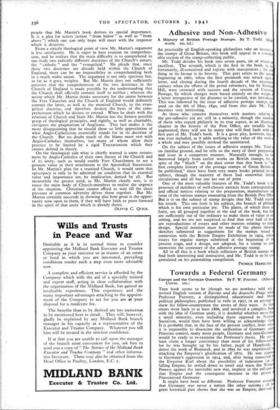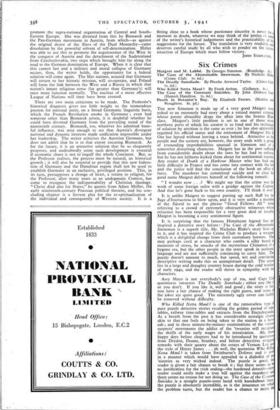Towards a Federal Germany
Tins book seems to be (though we are nowhere told so), revised English version of Europa and die deutsche Frage whi, Professor Foerster, a distinguished educationist and libel political philosopher, published in exile in 1937, in an attempt tt show his fellow-countrymen the errors of their ways. As then errors went back to at least 1866, and involved a complete breal with the idea of German unity, it is doubtful whether more that a small minority, even including those opposed to Nano Socialism, would then have been willing to acknowledge the It is probable that, in the face of the present conflict, from wilt it is impossible to dissociate the unification of Germany undo Prussian control, many more people, Germans and non-German; would be ready to re-examine the Professor's thesis. He can least claim a longer consistency than most of his fellow-exiled for he was brought up by his father, pupil of Humboldt, detest the work of Bismarck, and in 1895 he was imprisoned f attacking the Emperor's glorification of 187o. He was 01,130° to Germany's aggression in 1914, and, after being consulted b' the Emperor Karl about the possibility of federation for It falling Empire, he settled down to await and warn the Westel Powers against the inevitable new war, implicit in the collapse that Empire and the consequent increase in the power Prussianised Germany. It might have been so different. Professor Foerster contend that Germany was never a nation like other nations ; all h great historical past shows that she was an Empire, destined promote the supra-national organiSation of Central and South- Eastern Europe. She was diverted from this by Bismarck and the Pan-German movement in Austria, from which—as against the original desire of the Slays of the Dual Monarchy—came dissolution by the powerful solvent of self-determination. Hitler was able to use this to promote the acquiescence of the West in the conquest of Austria and the detachment of the Sudetenland from Czechoslovakia, two steps which brought him far along the road to the German domination of Europe. When it is clear that this cannot last and a military and moral collapse, of Germany occurs, then, the writer holds, the opportunity for a federal solution will come again. The Slav nations, assured that Germany will return to her historic mission, will co-operate, and Poland will form the link between the West and a Russia in which that nation's innate religious sense (far greater than Germany's) will once more function normally. The nucleus of a more effective League of Nations will then have been created.
There are two main criticisms to be made. The Professor's historical diagnosis gives too little weight to the tremendous passion for national unity, on a broad Germanic linguistic basis, which the French Revolution awoke in Germany ; even had someone other than Bismarck arisen, it is doubtful whether he could have diverted Germany from the prevailing trend of the nineteenth century. Bismarck, too, whatever his admitted bane- ful influence, was wise enough to see that Austria's divergent national and dynastic interests made unification impossible under her leadership. The writer criticises the Austrian Germans, but does not admit that he is to that extent excusing Bismarck. As for the future, it is an attractive solution that he so eloquently proposes, and undoubtedly some such development is essential if economic chaos is not to engulf the whole Continent. But, as the Professor realises, the process must be natural, an historical growth ; • it will also be essential to provide that this new federa- tion of Germany and the Danubian region shall not be used to establish Germany in an exclusive, privileged position. This, in its turn, presupposes a change of heart, a return to religion, for the Professor,• after many years as an undogmatic Comtist, has come to recognise the indispensability of Christian theology. " Christ died also for States," he quotes from Adam Muller, the early nineteenth-century Prussian political theorist, and his con- cluding chapter is a fervent plea for the re-spiritualisation of the individual and consequently of Western society. It is a
fitting close to a book whose passionate sincerity is never for moment in doubt, whatever we may think of the justice of s of the writer's historical judgements and the practicability of his suggestions for the future. The translation is very readable and deserves careful study by all who wish to ponder on the recoil. struction of Europe which must follow victory.
JOHN STAPLETON.



























 Previous page
Previous page